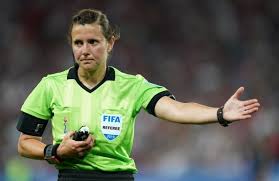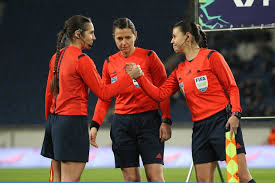In 2016, Kateryna Monzul made history. She became the first female referee in Ukraine to officiate a soccer match in the men's top division. "I’ll be honest with you - I was very emotional and nervous. I prepared myself for the match. But despite mental training, when I went out on a soccer pitch and watched teams lining up, I could even hear my heart racing. I was overwhelmed with emotions."
Monzul’s career has taken her from refereeing children's and youth championships to the 2015 Women's World Cup Final between the U.S. and Japan. Since then she became the first woman to referee Ukraine's domestic cup final and was named the best referee in the men's division by the Ukrainian Football Association. Her passion for soccer began where she grew up in the eastern Kharkiv region. "When I was a kid, a house where I lived was next to a soccer pitch. So I spent my whole childhood there. I played soccer with boys. It was not popular among girls back then, but I liked it, since I lived and breathed soccer."
Women referees at men’s top flight soccer matches are rare. France's Stephanie Frappart became the first woman to referee a major UEFA competition final in 2019. To be eligible for officiating men's matches, women must pass a men's fitness test - which Monzul says is the toughest part. When it comes to the refereeing - she says there's no difference between refereeing a men's or women's match, except that it is a common thing for men's clubs to give Monzul flowers. "Before the match captains of the two teams gave me flower bouquets - one with yellow flowers and one with red flowers. And later on during the game, the team which gave me red flowers got a red card. Since then, there is a joke that it is better to give flowers after the game, not before. Just like in any other job, the most important thing is to do your job professionally, then your skills will be in demand, no matter if you are a man or a woman. It is the result which matters, not gender."
Source: Yahoo

